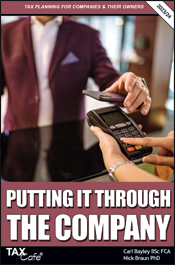Small Business Tax Planning Tips
Tax Guides from Taxcafe
Save on accountancy fees
The amount you pay in fees will depend upon the amount of time it takes to prepare your accounts. Delivering a large pile of receipts and invoices to your accountant will result in a very large bill. By taking time to do some basic bookkeeping you may be able to cut your bill in half, if not more. If you have neither the time nor the inclination to prepare basic records, think about using a bookkeeper during the year. This should work out a lot cheaper.
Track of your business mileage the easy way
Using the free route planning calculators on the RAC and AA websites, simply plug in your start and destination post codes and out pops an accurate mileage figure. You can even print out the document for proof to satisfy the tax inspectors. It certainly beats keeping a manual log in the car.
Get your invoices paid quicker
Do you currently automatically offer 30 days credit, but normally get paid in 45 or 60 days? Did your customers negotiate these credit terms at the start of a contract, or did you just offer them by default? By cutting your due date to 14, 7 or even zero days you can make your payment seem more important and it also allows you to follow up debts while they are still fresh in the mind. In a service business this strategy can work particularly well. Also remember to include on your invoices all the relevant information, i.e. the due date for payment plus full payment details, including who to make cheques payable to, where to send them and your banking details for electronic payment.
Keeping it regular saves you tax
Keep on top of your accounting records by doing a little bit every week or month. This way you are likely to save money as well because you’ll be more likely to remember any costs you have paid privately that don’t appear in your business bank account and less likely to mislay your receipts. Remember that valid business expenses results in a lower tax bill.
How to find things on the HMRC website
HMRC’s website isn’t the easiest to navigate by any stretch of the imagination and the search facility is pretty ineffective. Fortunately many common documents will be the top search on general search engines such as Google UK. You can specifically search just HM RC’s website using Google by entering “site:hmrc.gov.uk” after your normal keywords.
Calling HMRC helplines
I have two tips to help you when phoning the taxman:
- If the line is constantly engaged, just keep hitting redial – often the queues are relatively short once you get a ringing tone.
- As the quality of help given can be very patchy and occasionally misleading, it’s often worth ringing twice to ensure you get given the same answer the second time.
Changes to self assessment deadlines
Don’t get caught out by changes to the self assessment system for the tax year ending April 5 th 2008. All paper returns will need to be sent in by the 31 st October 2008 and not January 2009 as is the current system. So if you normally start thinking about your tax return when the Christmas decorations come down you may have to start when you come back from your summer holiday, or alternatively file online next year.
Filing early will also come with an added incentive as HM RC will only be able to open an enquiry into your return within 12 months from the date of submission. Therefore from April 2008, the earlier you file, the earlier you will have certainty over your affairs.
Apply for the VAT Flat Rate Scheme
If you find VAT a pain in the neck, apply for the flat rate scheme which lets you pay over a flat percentage of your turnover every quarter rather than working out the VAT on every single receipt. You can often make significant VAT savings too if your business expenses don’t contain too much VAT. However, you could end up paying more VAT, so be careful to do the calculations for your own business. You can apply for the Flat Rate Scheme if your turnover is less than £150,000.
Significant cash flow advantages are available for both filing your VAT return online (you can pay up to 10 days later if paying by direct debit) and by using the cash accounting scheme which allows you to account for your VAT when you get paid, not when you send out your invoices. If your turnover is under £660,000 you can you this scheme qualify as long as you are consistent in its application.
Claiming back VAT on mileage
Many small businesses miss the opportunity to reclaim VAT on the petrol element of the 40p per mile mileage allowance. The published rates of fuel vary but a small business owner driving their own 2.2 litre vehicle for 10,000 business miles per year from January 2008 would be able to claim back £282. This is worked out using the VAT element of 19p (19/1.1.75 = 2.82p) multiplied by the number of miles (10,000). Not a bad saving for a quick bit of maths!





